There goes mid-terms. I'm not sure if that half semester went quickly or not. As for classes, the time flew by. When I look back to all the people I've met, launching and developing Astropreneurs, the labs I've visited, all the entrepreneurs and business leaders I've listened to and learned from, it seems like a good year of living has been stuffed into this seven weeks.

I'm on the airplane to New Mexico now for the X Prize Cup. stoked about the Cup, but disappointed that I'll be missing all the mid term parties. I'm really starting to like the friends I'm making at MIT Sloan. Just before leaving, I realized I needed to make a couple last minute stops by school, so I took a cab instead of the T. Through round about circumstances, I ended having a fun conversation with Ramell, the cab driver. Totally a cool guy from Haiti, moved to New York in '70, off to Boston in '91, and he'll probably head to Florida after a few more years here. 57 years old, and just doing his thing, driving a taxi like he's been doing ever since New York.
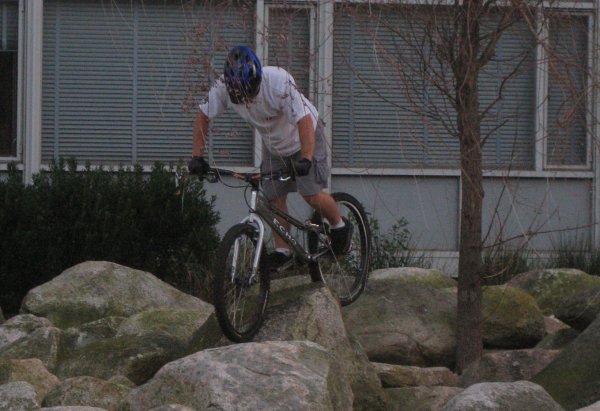
The leaves are changing, and it's getting cooler, but the weather is still beautiful for spending time outside. I used to do some trials riding like this guy, but this is the first time I've see anyone else doing it.

It's interesting seeing how people have been reacting differently during mid terms. Some people have been pretty stressed about it, some haven't been stressed but have put in loads of studying, some maybe haven't been as concerned as they ought to be. I think I successfully found the perfect balance between preparing and having a good time. but at the same time, I'm not interested in going into I-Banking or Consulting where (apparently) your grades actually matter.
I invited my Ocean over for brunch last Sunday. I love cooking breakfast for lots of people. I've become a slacker with my camera though. no pictures.
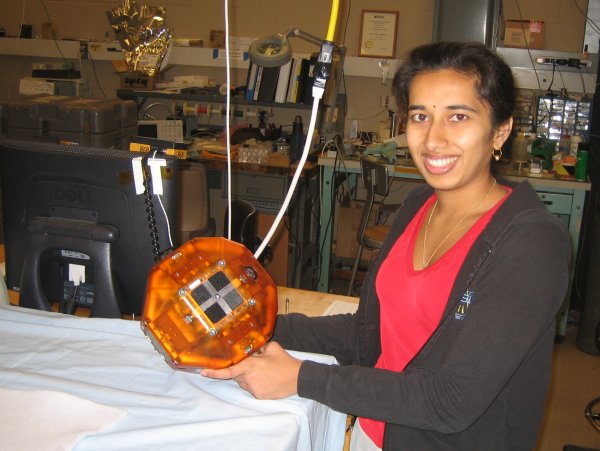
MIT Spheres. They have ten or so of these spheres, three currently on the International Space Station, one heading up in the Space Shuttle soon, and others floating around elsewhere. Swati here is responsible for a lot of the coding to make these things dance with each other, and will be heading out to train the astronauts in the experiments they'll be running with them next. Cool little toys. They sense their location and the location of other spheres with little sonic sensors and beacons.
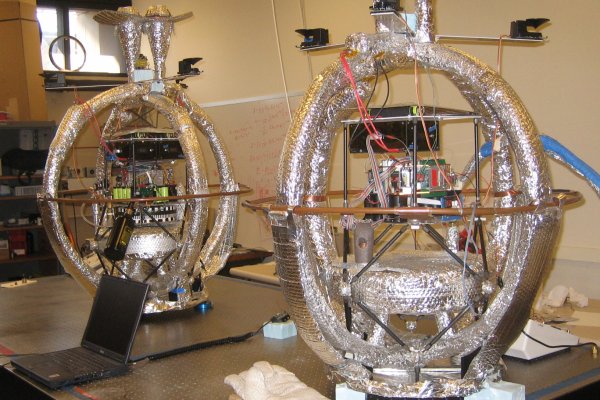
And these funny looking things are the toys for developing Electro-Magnetic Formation Flight (EMFF). From about fifteen feet apart, they can create enough force to pull themselves together in less than fifteen seconds, and they can navigate with each other in formation, totally by electromagnetic forces.
I forgot to note last time about the phone call from Anousia Ansari while she was up in the International Space Station. Sending a live television feed over satellite seems to be super easy and reliable, but communication over a phone call from the ISS is far from reliable. The first attempt (a Friday) flopped after several dropouts. The second attempt (a Sunday) was a half success, with a few drops and intermittent blanks in the sound. While the novelty of hearing Anousia talk was cool, the whole thing opened my eyes to the enormous need for improving space based communication. I still can't believe how ridiculously horrible the feed was.
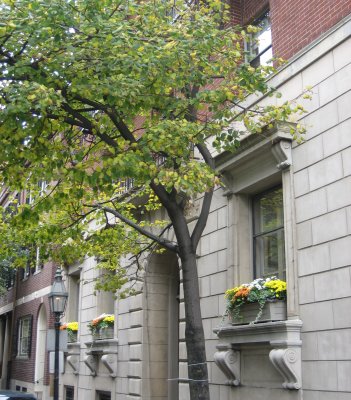
Last weekend I spent some time on the phone with an Aero Astro Alum who did his undergrad here, grad work at Cal Tech, has been in Aerospace Consulting in Wash. DC for the past four years, is near finishing his Law degree part time through Georgetown, and is looking for a couple students from our Astropreneurs Club to join his team for a Fractionated Spacecraft venture he's ready to pitch to VC's. There is also another MIT Aero-Astro alum in the Bay Area who heard about Astropreneurs through the network, and this weekend we'll be talking about some ideas he has been churning.
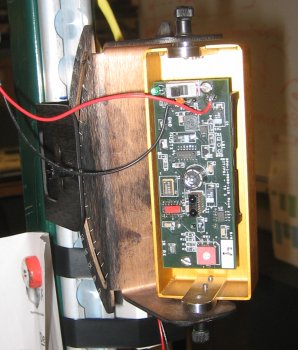
(Spheres Locating Beacon)
I was thinking about how to channel our purpose in this club; how to use some sort of gauge that would focus our efforts toward our objective through a measurable method. I invented our Return on Investment metric.
ROI = Profits / Investment
Revenues:
Cash awards from Business Competitions
Investment Funds through Angels and VC's
Starting Salary from Jobs with Ventures and Startups
Expenses:
External Funding
Meetings (hourly charge)
I though that was sort of fun, and it will be a fun metric to watch over multiple years. (We'll calculate it with Revenues over Expenses. not technically ROI, but who's counting?).
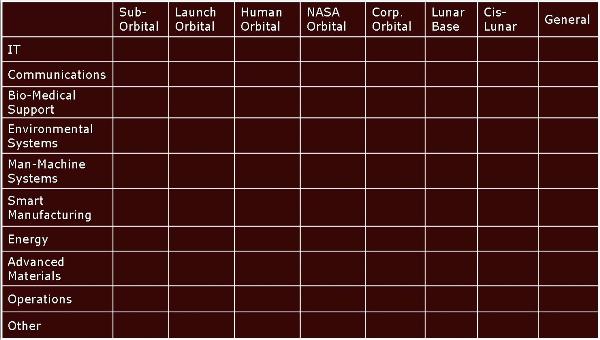
For generating and categorizing ventures, we created a matrix of technologies and spaceflight industries. We derived the technology sectors from Red Planet Capital, a VC group backed by NASA with $75M to invest in spaceflight advancing ventures over the next five years. Then we crossed those technology sectors with the varying spaceflight markets needing the proposed advancements.
We had four teams present venture proposals they generated over the last week, and the proposals were more thought out and more worthwhile than I had expected. Next week we'll show up with another set of entirely new proposals. Then we'll buckle down and start generating proposals to submit to the MIT $1K this semester, leading into the MIT $100K next semester, and also the $25K Lunar Venture Challenge sponsored by NASA.
Our IT guy from MIT Sloan has generated a killer web based team workspace for us to use for the club, and done so incredibly quickly. We're making most of our materials available for anybody interested in using them for relevant purposes. Eventually we'll get it ported to www.Astropreneurs.org, but that is still a little time away.
Leadership Lessons #
I've historically scoffed at much of the notion of "leadership." Not because I didn't think it was important, but it seemed like glorified praise for management or teaching. Through this MIT Astropreneurs Club, I have seen a distinct difference between management, teaching (both of which I have done many other times in my life), and this category of "leadership." Even at that, I think I am experiencing the activity of "organizational creation" more than "leadership," but I see a new dimension I didn't see previously.
It has been a real surprise to me, the brain cycles required in launching this whole MIT Astropreneurs Club. Much of the logistics, preparations, etc, are being carried by the club officers (management / delegation), but the thought necessary to design this organization to accomplish what we want has been far more deliberate than I expected. Then to communicate the design ideas to others wasn't as easy as I anticipated (Fortunately we're all on the same page, but I thought people could intuitively read my mind better).
So far, I feel like I've made the right moves with each step in the progression. Even so, it feels like each idea has arrived just in time for implementation. Once everything is together, it appears very natural and intuitive that it should be this way (I take that as a sign that it has been designed correctly). But starting from nothing, with no precedent for what or how to do things, is demanding. Its fun having a clean slate to create whatever I want, but it takes thought and decision to go through the initial creation process.
It has been invaluable to have other observant and realistic minded officers and club members through the process. They've contributed significantly to our present condition, but I've had to start with a clear idea in my mind (one that stood up to my own intellectual scrutiny), and communicate that idea. It has been very beneficial to hear the occasional "I object" to a proposed idea, and hear the accompanying rationale. The easy part is adapting that idea to the constructive suggestions of others. But I have been surprised to see how important it is that I begin with an initial clearly defined starting point, and then wrap everything into a clearly defined collection at the end. Even with the constructive adaptation through which others contribute, I have seen that a quality initial idea is critical to the effectiveness of the collaborative improvement process.
I have learned the value in seeking out models and ideas that other people and organizations have already developed. It is far easier to develop an effective organizational mechanism through evaluation and critique of what others have done. Arranging a piecemeal of other ideas hasn't been an optimal alternative yet, but other ideas certainly provide worthwhile starting points. and I enjoy referencing who I believe are quality sources.
I have stumbled through a bit of creating the culture of this organization. I like to allow groups to grow and develop organically, but even that style is fostered by decision (or indecision). A friend from LA who is in his second year at HBS, has brought some valuable professionalism to the officers meetings (professionalism that doesn't naturally grow at MIT). Having his outside influence offers the opportunity to implement a precedent that I initially hadn't seen available. The significant realization I didn't expect is that I am in the strongest position to influence what precedents will be carried and which will not. and if I want to implement something that doesn't haphazardly happen, I'll have to develop a mechanism to make it happen.
I have also seen how showing up unprepared, without clear objectives in mind, or without an organized agenda, could make a highly disorganized and ineffective meeting. A series of such meetings could let a great idea flop and go nowhere. I suddenly have a huge appreciation for my manager back in Azusa, who ran such effective and organized meetings. I didn't realize the skill she worked with, and I'm adopting several of her methods.
I also laughed when I realized that nobody in this group has any preconceptions of who I am, and what my style has been. All the expectations they have begun to develop are entirely based on their interaction with me under these conditions. I'll be in this similar scenario when I graduate and integrate into the larger Northrop Grumman Corporation. Opportunity to be leveraged as I choose to use it.
In summary, I'm learning a lot about "organizational creation." This has been far more effective than a class full of case studies and discussions. I still think "leadership" is something else. something dealing with influencing other people. All the MIT Astropreneurs (and our HBS consortium) are already motivated toward our common purpose. This club is an enabling mechanism for us, and I am organizing it as such, to the best of my ability. Organizing is enabling, whereas leading is influencing. and I don't think I'm doing any substantial influencing in this role.
It's been a lot of fun, and I'm looking forward to the rest of the experience... well, looking forward to the rest of life for that matter.
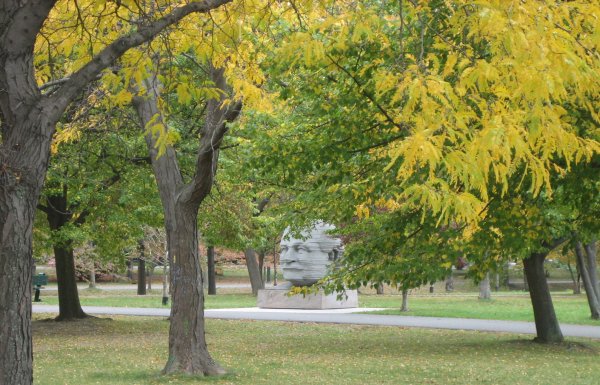
(Hint: Einstein is in this picture)
And before I end this... there is one other development over these last six or seven weeks that has been far more significant than any of this... but I'm not going to write about that now.